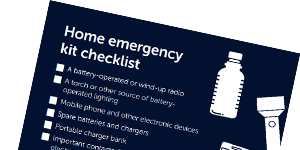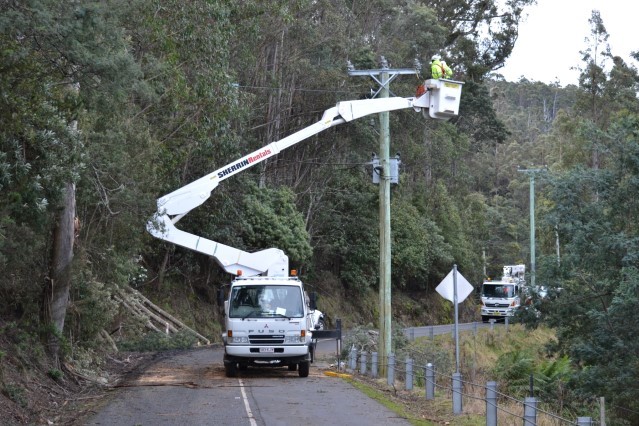Prepare for power outages
Floods, storms, bushfires and severe weather can cause power outages. Don't be left in the dark - make sure you're ready to deal with power outages by being prepared.
It's time to kit up
Prepare a home emergency kit with items to assist you during a power outage. Download our home emergency kit checklist (PDF), print it out and tick off the items as you get them.

How to prepare for power outages
-
Before
- If you're dependent on electric powered, life-sustaining equipment, view our information for life support equipment
- Learn how to manually override electronic access to your home or garage
- Prepare a home emergency kit that includes items to assist you during a power outage. Items to include are:
- A battery-operated or wind-up radio
- A torch or other source of battery-operated lighting (don't include candles as this can create a fire risk)
- Mobile phone and other electronic devices
- Spare batteries and chargers
- Portable charger bank
- Important contacts, like our electrical emergencies and power outages line - 132 004
- First aid kit and any medications essential to you and your family’s health
- Special items for any vulnerable people, such as babies
- Portable generator
- Gas barbecue for outdoor cooking
- Non-perishable food and water
- Utensils and a can opener
- Blankets and warm clothing
-
During
- Listen to your local ABC Radio station on a battery-powered radio or the car radio for power restoration updates
- Turn off appliances like TVs, computers, laptops or any appliance that'll turn on automatically when power is restored
- Avoid opening the fridge or freezer. Food will last longer if you keep doors closed
- Use a portable generator with caution. Always use it in a well-ventilated dry area and connect appliances directly to the generator. Don't plug back-up generators into your switchboard. It's dangerous and can impact our crews trying to repair the network
- If you have solar panels, these may still generate electricity. Don't climb onto your roof to inspect the panels
- Close curtains to keep warm
- Pipes can freeze and burst in winter. If necessary, leave taps to drip
-
After
- Restock and recharge batteries you used
- Throw out food that has gone off in the fridge or freezer. Read more about food safety on the Food Safety Informaiton Council website
- If you have solar panels, check your solar system has been restored after any planned or unplanned outage. Not all solar inverters switch back on automatically
How to prepare for a storm
-
Before
- Tie down loose items around your home and garden that could become airborne during severe winds such as outdoor furniture, building materials, trampolines and other play equipment
- Identify and prune trees that could come down in a storm. Don’t attempt to trim trees near powerlines yourself
- Keep your house weatherproof. Replace broken roof tiles, keep gutters clean and fix leaks to ensure water cannot access electrical systems or appliances
- Know the location of your meter box and mains switches and make sure these are protected from water damage
-
During
- Stay at least 10 metres away from fallen powerlines or anything touching them
- Report any fallen powerlines (or trees or branches in contact with powerlines) to us on 132 004
- Unplug sensitive appliances like computers and televisions
- Don’t use a landline telephone during a thunderstorm
- Listen to your battery-powered radio for weather updates (alternatively use your car radio. Many mobile phones also have in-built FM radios)
-
After
- Watch out for fallen powerlines, particularly those hidden in trees or other storm debris
- Always assume fallen powerlines are live and don’t approach them
- Don’t swim in flooded creeks and drains as they could hide fallen powerlines
How to prepare for a bushfire
-
Before
- Because bushfires can cause extended power outages, don't rely on power supply as part of your Bushfire Survival Plan
- Equipment such as electric water pumps can't be used if your power supply is interrupted – prepare a generator, diesel-powered or petrol-powered pump instead
On Total Fire Ban days
- For everyone’s safety, on Total Fire Ban days we take extra precautions when operating the electricity network
- These precautions include altering our processes to ensure power doesn’t automatically restore following a fault
- As this process involves a physical inspection of powerlines, it may take a longer for power outages to be restored
- We understand no one likes power outages and longer restoration times may be frustrating. However, the safety of our people and our communities are our number one priority and this process is an important part of reducing the risk of fire
-
During
- Exercise caution when using generators. Never use a generator inside or try to power the house or "backfeed" supply
- Hot and windy weather can increase the sag and swing of powerlines. A reminder to Look Up, Look Out for sagging powerlines and anything that could touch them. Report any instances of fallen powerlines to us on 132 004 immediately
- Listen to your local ABC Radio station and keep up to date with current outages
-
After
- When returning to your home make sure it’s safe to do so
- Keep an eye out for fallen or damaged powerlines. Report fallen or damaged powerlines to us on 132 004
- If you’re returning to your home in a bushfire-affected area, ensure your CablePI is plugged in and switched on. When it's working correctly it'll show a solid green light. An alarm or flashing amber light indicates a problem. If this occurs, stay away from sinks, taps or other metallic objects in your house and immediately call us on 132 004. If you don't have a CablePI, order one for free
- If you experience tingling taps, flickering lights or notice any other indications that something might be wrong, call us immediately on 132 004
- If your home or property has been impacted by fire (including by embers and ash) your electrical wiring, circuit breakers and fuses will need to be confirmed safe by an electrician. Have your home inspected by an electrician and repairs carried out before contacting us to have power restored. For safety purposes, an electrician will have to provide us with a Certificate of Electrical Compliance before reconnection if you’ve been disconnected
- Don't plug in or use appliances or equipment that may have been damaged by fire until they've been checked by an electrician. If you're unsure if equipment has been damaged, have it inspected before you plug it in
How to prepare for a flood
-
Before
- Where possible raise all electrical appliances before the flood
- If you have some warning you'll be flooded, contact us on 132 004 to have your supply disconnected beforehand. Please call as early as possible to allow time for us to respond
- If your supply hasn't been disconnected, turn off all switches and main switches before the flood
-
During
- Don't stay inside a flooded building when the power is connected
- Don't use any electrical appliances that have been wet or damaged
- If you're in a boat, be aware rising floodwaters reduce the clearance of overhead powerlines and assume powerlines are live
- Stay away from the electricity infrastructure, including poles, substations, fallen powerlines and any objects in contact with them. Electricity can arc to surrounding objects, which means you can be seriously injured by electricity without actually touching the powerline
- If parts of the electricity network or fallen powerlines are covered in floodwater, stay as far away as possible because water conducts electricity
- If you receive a shock or tingling sensation from any electrical appliances, plumbing, metal, sink or bath, avoid all contact with the appliance or metallic fixtures in question. Call us on 132 004 to report the problem as soon as you can and seek medical advice
-
After
- If you receive a shock or tingling sensation from any electrical appliances, plumbing, metal, sink or bath, avoid all contact with the appliance or metallic fixtures in question. Call us on 132 004 to report the problem as soon as you can and seek medical advice
- Don’t swim in flooded creeks and drains as they could hide fallen powerlines
- If your home/shed has been affected by flooding, your wiring, circuit breakers, fuses and appliances will need to be safety checked by an electrician and ensure repairs are carried out before contacting us to have power restored. For safety purposes, an electrician will have to provide us with a Certificate of Electrical Compliance before reconnection if you've been disconnected

Stay in touch
When there's a power outage, stay up to date by checking the status of power outages and getting updates from the Bureau of Meteorology and TasAlert

